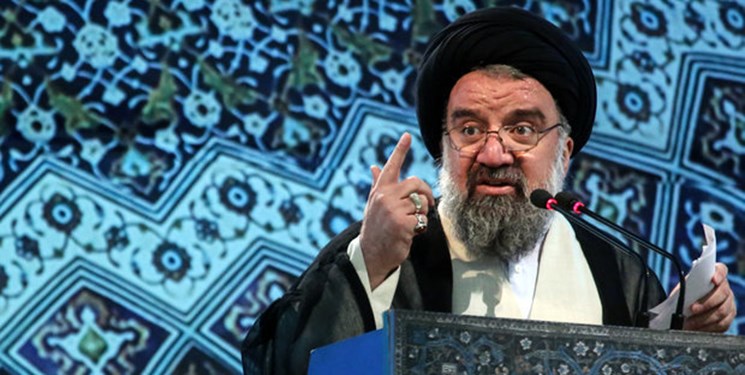
Tehran’s provisional Friday Prayers Leader Ayatollah Seyed Ahmad Khatami underlined that the purpose of the recent anti-Iran resolution at the International Atomic Energy Agency (IAEA) Board of Governors was to force Tehran to give concessions during the talks in Vienna, but failed.
Addressing a congregation of people at Tehran’s Imam Khomeini Grand Mosalla (congregational prayers site), Ayatolallah Khatami said, “The Wednesday anti-Iran resolution at the IAEA Board of Governors was aimed at making the Islamic Republic to give concession in the negotiations.”
Ayatollah Khatami said that the Islamic Republic will not give in to the Western countries’ pressures and will remain loyal to the ideals of its revolution set out by Late Imam Khomeini.
The senior Iranian cleric also criticized the visit of the IAEA director general Rafael Grossi to Israel, saying, “The anti-Iran resolution drafted by the Western countries in fact came after the visit, pointing out that the visit was to coordinate the attempts to approve the resolution.”
The IAEA approved a resolution, proposed by the US, Germany, France and Britain, against Iran late Wednesday with 30 votes in favor, two against and three abstentions.
The Iranian foreign ministry denounced the “non-constructive approach” of the IAEA, saying the Islamic Republic “has taken practical quid pro quo steps which include installation of advanced centrifuges and deactivation of cameras operating outside the Safeguards Agreement”.
“The adoption of this resolution, which is based on the hasty and unbalanced report of the Director General of the IAEA and on false and fabricated information of the Zionist regime, will only weaken the process of cooperation and interaction of the Islamic Republic of Iran with the IAEA,” it said.
The statement said the IAEA appeared to have resurrected issues which had been settled between the two sides seven years ago, despite the Islamic Republic having “always cooperated constructively” with the agency in recent years.
Iran, it said, had showed its good faith in cooperation with the IAEA by providing accurate technical information as confirmed by their joint statement issued in March when IAEA Director General Rafael Grossi visited Tehran.
“Likewise, the Agency was expected to take an independent, impartial and professional approach, taking constructive and realistic steps to normalize safeguards issues that according to the Agency own admission did not bear proliferation concerns,” the statement said.
“It seems some have forgotten that all past issues were closed once and for all on December 15, 2015 by the Board of Governors,” it added.
The foreign ministry statement denounced the resolution as a “political, wrongful and unconstructive act” against a country which “currently has one of the most transparent peaceful nuclear programs among the IAEA members”.







